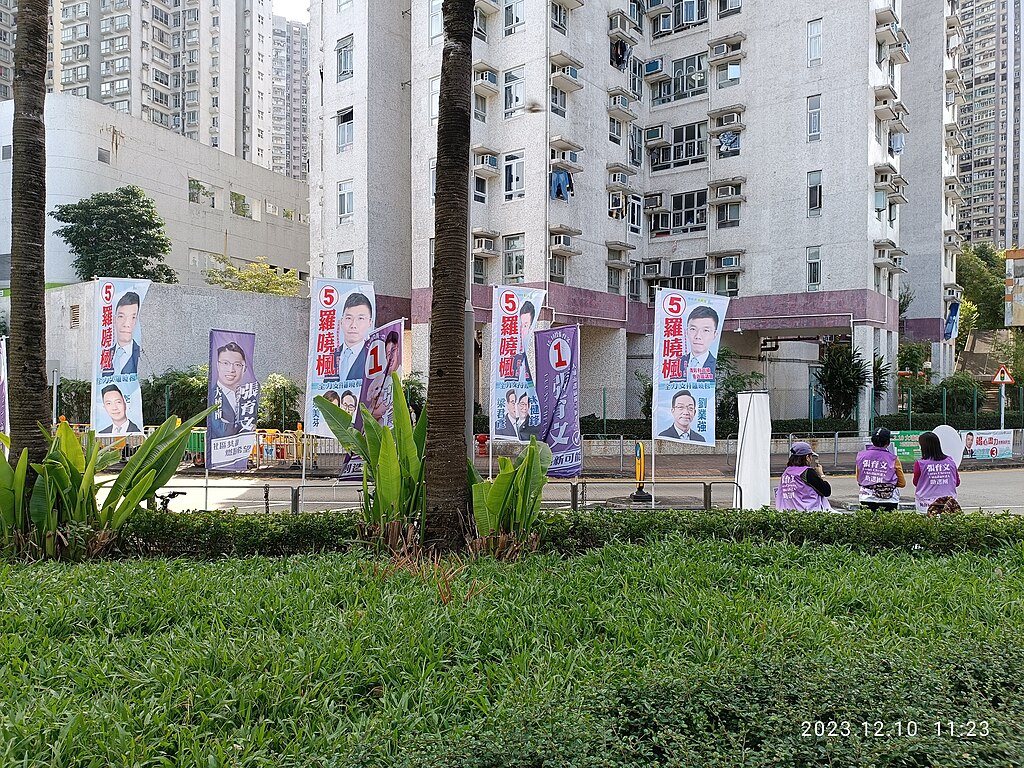Hong Kong’s anti-democratic elections?

Election banners along Tat Wan Road in 2023
Anna Johnson - Hong Kong’s electoral processes underwent a complicated overhaul in 2020 placing new rules and protocols on candidates hoping to earn one of the only 88 directly elected seats in Hong Kong’s legislature. The rules, imposed by China, created a two-tiered vetting system for candidates so only those deemed “patriots” would be eligible to run. In the 2021 election immediately following the rule change just 30% of registered voters cast a ballot, the lowest number in 30 years. Hong Kong hit another record low this year with 27.5% turnout.
China has tried to mobilize to garner support for the election rules, calling it a “patriots-only” election. Officials say the rules are to prevent bad actors from disrupting the system and destabilizing the government. Their chief executive, the highest-ranking government official in their semi-autonomous system, said the rules would put an end to the instability and social unrest in Hong Kong from pro-democracy protests in 2019. The rhetoric surrounding the election rules centers on the idea of “patriots” supporting the state. Political leaders and election officials justify restricting the field of candidates through the shared sense of attachment and loyalty to the nation. If supporting these changes makes you a true patriot, going against them or challenging them makes you a traitor to your nation. Opposition leaders say instead of building up Hong Kong’s sense of nationalism, these election rules and the campaign to try and raise support for them destroy it. They say the record-low turnout is a manifestation of people’s dissatisfaction with the government's handling of both the pro-democracy protests of 2019 and Hong Kong’s complex relationship with the Chinese government. Those candidates allowed to run in the elections tend to be more pro-China and anti-democracy, unlike public opinion which gave pro-democracy candidates a landslide victory during the 2019 elections immediately following the protests. By skewing the field of candidates in this democratically held election, the government has effectively made it undemocratic, allowing only those approved by the establishment and who support those already in power to lead. Some Hongkongers, even those who do not see themselves as pro-democracy reformers, feel their votes no longer matter since they can only choose from a list of pre-approved, pro-establishment “patriots.”
This complicated relationship with nationalism and the rules imposed by China are both part of Hong Kong’s geopolitical . Since China regained control over Hong Kong in 1997, Hong Kong has been a part of China but is managed under the “one country, two systems” policy. This gives Hong Kong some level of autonomy to maintain the system put in place by the British during its colonial rule, but the long-term outlook for Hong Kong includes reintegration with China. This outlook has split Hong Kong’s population into pro-democracy and pro-China camps, fueling fierce protests and competition for political office. Additional conflicts between those living on China’s mainland and Hongkongers further complicate the relationship.
Photo Credit: Kitgor Shiklap Poerw, CC0, via Wikimedia Commons

